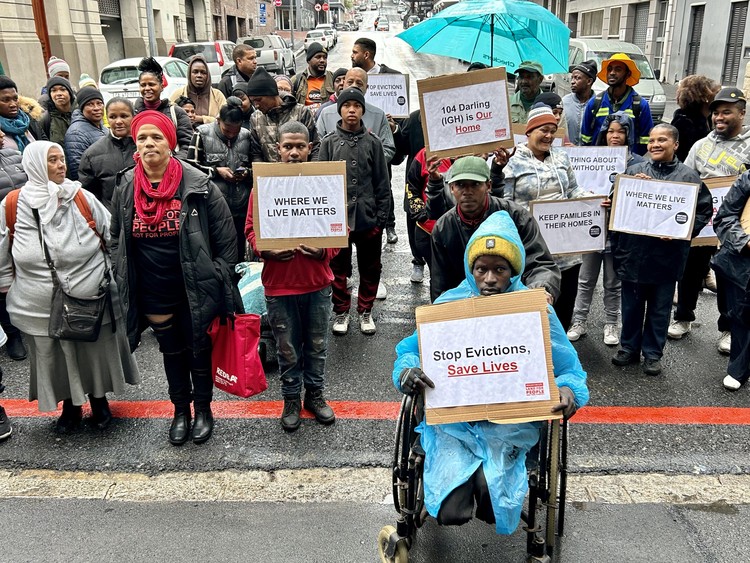Darling Street families in limbo after eviction case postponed
The Department of Public Works will meet with the City of Cape Town to discuss alternative accommodation
Darling Street residents and supporters outside the Western Cape High Court on Thursday. Photo: Matthew Hirsch
More than 30 residents of a dilapidated government-owned building, 104 Darling Street in Cape Town, remain in limbo as their urgent eviction case was postponed again.
The building is owned by the Department of Public Works and Infrastructure, which is seeking to evict the residents. The department says the building is unsafe to live in and will likely have to be demolished.
The department is gathering proposals from the private sector for what to do with the building once the residents are evicted.
After a brief meeting on Thursday with both parties in Western Cape High Court Judge Mokgoatji Dolamo’s chambers, the matter was postponed at the request of the department. Two months ago, the department’s state lawyers failed to show up to court to defend their application.
Department spokesperson Lennox Mabaso said that the postponement will allow for the department to meet with the City of Cape Town to discuss alternative accommodation options.
Outside the court, about 50 people stood in the rain in support of the residents. Some of the placards read: “Stop evictions, save lives” and “104 Darling Street is our home”.
One of the building’s residents, Barrymore Jossie, expressed frustration over the repeated delays. “It keeps me in limbo, not knowing what’s going to happen,” he said.
The residents are represented by the Ndifuna Ukwazi Law Centre. Lorenzo Johnson, from the organisation, addressed the crowd outside court, criticising the lack of affordable housing in the inner city.
“We need emergency and affordable housing in the inner-city and well-located areas. We do not want to be displaced to the peripheries of the city,” he said.
“Why do we need to spend two-thirds of our salary to come into Cape Town for minimum wage? How are we supposed to survive? They have failed in addressing spatial apartheid. Build us decent housing in the inner-city.”
Support independent journalism
Donate using Payfast

Don't miss out on the latest news
We respect your privacy, and promise we won't spam you.
Next: We tested Zamzam water sold in South Africa. Here’s what we found
Previous: South Africa needs to do more to tackle antimicrobial resistance, warn experts
© 2025 GroundUp. This article is licensed under a Creative Commons Attribution-NoDerivatives 4.0 International License.
You may republish this article, so long as you credit the authors and GroundUp, and do not change the text. Please include a link back to the original article.
We put an invisible pixel in the article so that we can count traffic to republishers. All analytics tools are solely on our servers. We do not give our logs to any third party. Logs are deleted after two weeks. We do not use any IP address identifying information except to count regional traffic. We are solely interested in counting hits, not tracking users. If you republish, please do not delete the invisible pixel.

